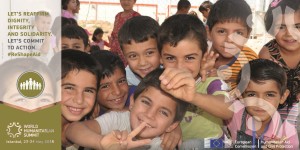Over 50 world leaders and 5 000 humanitarian, development and political stakeholders gather on 23-24 May, in Istanbul, to share responsibility to reverse the trend for increasing humanitarian needs and improve the effectiveness of response.
The European Union (EU) and its Member States will jointly call for a global partnership for a more efficient and effective humanitarian aid system at the first-ever World Humanitarian Summit in Istanbul, Turkey. As a major donor and key policy-setter, the EU and its Member States will play a leading role at the Summit on 23-24 May, where over 50 world leaders and some 5,000 humanitarian, development and political stakeholders gather to shift from response to crisis towards effectively managing prevention and early action and supporting resilience and self-reliance. Worldwide, over 125 million men, women and children are in need of humanitarian assistance. Despite record contributions in recent years, donors cannot fully cover the growing humanitarian needs generated by today’s emergencies.
To ensure efficient and effective financing to address the US$15 billion funding gap, the “Grand Bargain” will be launched at the summit, a proposal made by the United Nations Secretary General’s High-Level Panel (HLP) on Humanitarian Financing in its report “Too Important to Fail: addressing the humanitarian financing gap”. European Commission Vice President and co-chair of the panel, Kristalina Georgieva, said: “Our goal over the next five years is to bring an additional billion dollars into the hands of people in dire need of live-saving help, by making efficiency savings on the backroom activities of donors and aid organisations. In the space of a few months, we have been able to negotiate a deal between major players in the humanitarian ecosystem – a deal addressing issues that have hindered and hampered life-saving work for years.”
To ensure that people in need receive rapid and unimpeded humanitarian assistance, an EU priority at the summit is promoting respect for International Humanitarian Law. Christos Stylianides, EU Commissioner for Humanitarian Aid and Crisis Management, stated: “In conflicts and crisis zones around the world, attacks on civilians, doctors and medical facilities as well as on humanitarian aid workers have become endemic. By keeping International Humanitarian Law at the top of the agenda of the World Humanitarian Summit, we can make a real difference. Protecting civilians and aid workers and ensuring humanitarian access is not a choice. It is a human imperative.”
If humanitarian aid is necessary and live-saving for millions of victims of violent conflict and natural disasters, longer-term solutions are needed. EU Commissioner for International Cooperation and Development, Neven Mimica, underlines the importance of bridging the gap between humanitarian and development aid, another top priority at the summit: “Medium and long term assistance plays an essential part in supporting partner countries in rebuilding damaged infrastructure and helping people to get back to normality. By strengthening links between relief, rehabilitation and development, by increasing resilience and making our aid more efficient and effective we can better tackle the root causes of many recurrent crises instead of only dealing with their consequences.”
Background
At the World Humanitarian Summit, the European Commission will be represented by Vice-President for Budget and Human Resources, Kristalina Georgieva, Commissioner for International Cooperation and Development, Neven Mimica and Commissioner for Humanitarian Aid and Crisis Management, Christos Stylianides.
The EU has been actively involved in the two-year long preparations to the Summit from the outset. In the consultation process, during which over 23 000 stakeholders such as governments, businesses, aid organisations, civil society, affected communities and youth groups were consulted, the European Commission co-organized the regional consultation in Budapest (February 2015), contributed to OCHA-led studies and supported the work of the WHS Secretariat.
For more information
MEMO/16/1853: The European Union at the World Humanitarian Summit: Priorities and Commitments
Read more about the EU’s vision on reshaping aid in the Council Conclusions adopted on 12 May 2016.
Find out more about the event on the WHS website.

